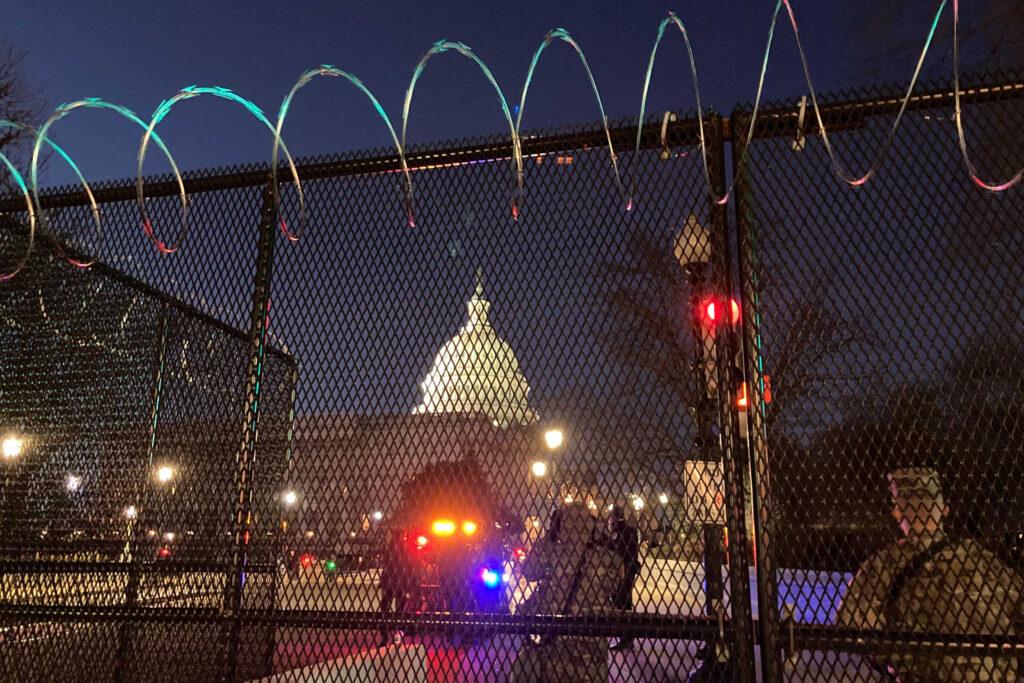
Lyle Darrah was on a conference call at work when the riot at the U.S. Capitol started on Jan. 6. When his boss mentioned what was happening, he turned on news coverage — and immediately felt his last allegiance to the Republican Party slipping away.
“I was completely shocked and ashamed. That’s not how I think of the Republicans — who we were, and who we are,” he said. “It’s something I felt I could no longer be in support of.”
That night, he talked with his wife over dinner at their home in the Weld County town of Mead. Darrah had been a lifelong Republican, while his spouse and children are Democrats — the kind of family that joked about canceling out each other’s votes.
Later, Darrah, age 49, sat in his living room and pulled up the state's voter registration website. And then, like thousands of other Coloradans in the wake of the insurrection, he left the Republican Party.
“I think it should be a signal,” said Darrah, a software company director who voted for former-President Donald Trump in 2016 and President Joe Biden in 2020.
His strongest political priorities are fiscal conservatism and national defense, he said.
“I don’t know if there’s anything to be said about being party loyal your entire life, if your party doesn’t go in the direction you want it to,” Darrah added.
But in this moment of upheaval, his story is just one of many reasons that voters have abandoned the GOP.

4,600 fewer Republicans after the riot
In the week from Jan. 6 through Jan. 12, about 4,600 Republicans changed their party status in Colorado, according to a CPR News analysis. There was no comparable effect with any other party. CPR News was able to contact dozens of them by tracking changes in the state’s voter file.
The number of people changing parties spiked immediately after the Capitol breach, though their motivations varied widely. About 200 made the same dramatic leap as Darrah, choosing to join the Democratic Party. Hundreds more went to conservative third parties.
And the vast majority — about 4,200 people — switched from Republican to unaffiliated status, accelerating a trend that has affected both parties in Colorado in recent years.
“I don’t think there would be any other reason why it would begin at that day except that they looked at what was happening in Washington, D.C., and decided this is a time for me to make what is clearly a symbolic move,” said Ryan Winger, director of data analysis and campaign strategy for Republican pollster Magellan Strategies.
All told, the Colorado GOP lost about a half a percent of its members in the week after the riot.
The thousands of newly unaffiliated voters can still support Republican candidates and participate in the party’s primaries. And both parties have seen registered members switch to unaffiliated in large numbers for years.
But interviews and data analysis show how the tumultuous post-election period, driven by the former president’s false claims of a stolen election and culminating in the Capitol riot and the current impeachment effort, has created a new split within the Republican Party.
For some right-of-center voters, like Lyle Darrah, the violence at the Capitol was simply the final straw. They described an increasingly strained relationship with the GOP, with some citing the rise of Sarah Palin more than a decade ago as the first sign that the party was focusing on culture wars instead of fiscal conservatism.
“As my husband said, it’s just become the party of mean people,” said Jo Swanson, 73, a retired school psychologist in Denver. She voted for Hillary Clinton in 2016 but didn’t register as a Democrat until this month. She had always considered herself more socially liberal, but her pro-life beliefs had held her back.
“I really found that hard to let go,” she said, adding that she’d still fight for abortion restrictions.

Trump supporters are leaving, too
Other newly former Republicans had the opposite reaction: They cut ties with the party because they felt its leaders had abandoned Trump by blaming him for the riot and refusing to overturn the election.
“I quickly realized that I would probably never vote for another Republican again. They have let America down,” said Cara Samantha Toney, a 45-year-old mother of three who switched from Republican to Libertarian in Jefferson County.
Phil Trubia, a 52-year-old Mesa County voter, made a similar move to the American Constitution Party. He sees himself continuing to vote for Trump loyalists like Rep. Lauren Boebert, but not mainstream Republicans.
“I do feel there is a split. I’m not necessarily doing it to hurt the Republican Party, but the way they turned their backs completely on Trump, that kind of got me really upset.”
The change was especially pronounced in Colorado’s politically competitive counties. In fact, nearly 800 of the switchers were in Douglas County, a Republican stronghold where the party has recently been losing strength — another dangerous signal for the GOP. It was the greatest concentration of defections, even though Douglas is only the seventh most populous county.
“There’s going to be a point where the party has to decide what kind of party it wants to be moving forward — and unfortunately for the party as a whole, that’s going to mean no matter which fork in the road they choose, they’re clearly going to lose what is part of the coalition or has been part of the coalition,” Winger said.
“The job after that is going to be to rebuild.”

To engage or retreat?
Among the dozens of voters CPR News called for this article, one theme was common: No one knew what would come next for the GOP. Few were optimistic. And some bought into terrifying conspiracy theories about what Democrats would do with their narrow majority in Congress.
One younger voter moved to unaffiliated because she feared that Republicans could be targeted for abuse. And many have asked themselves whether to step back from politics altogether.
“Part of me wants to think about all the preppers and people who are battening down the hatches at home and say well, they’re coming to take our guns, take our rights — and be fearful,” said Karen Trubia, who joined the Constitution Party with her husband, Phil.
“On the other hand, there are so many millions of people that did support Trump. That can’t just be swept under the rug either. ... I can’t see that they can make this socialistic, communistic party happen in less than two years.”
In Weld County, 44-year-old Sara Ocker switched from Republican to unaffiliated and doesn’t expect to vote again anytime soon, since she doesn’t believe the elections are run fairly.
“It feels like we’re living in the upside-down world,” she said. Ocker feels that “RINOs” betrayed the president and wrongly blamed him for the riots, and she added that it was impossible that any Trump supporter could have committed violence that day.
“We’ve all been living a lie and been told a lie,” she said.
She hasn’t spoken with her parents, who are Biden supporters, since the election. They see her as a QAnon conspiracy theorist, she said, but she thinks of herself as a skeptic who does her own research. Now, she fears a civil war — or, at the least, a generation-long rebuilding of conservative politics.
“A party’s got to implode,” she said. “I think that’s what’s happening to the Republican Party, a little bit.”
Others are taking a pragmatic approach: Where will they be able to influence politics the most as Colorado stays blue?
“I’ve gotta tell you, the vast majority of my friends are laughing at me, that I switched over to Democrat. They think I’m crazy,” said Martin Lee Hussman, 45.
A well-connected resident of Alamosa, he was previously a registered Libertarian but voted for Trump in the most recent election. And as he watched the fallout of the riots, he decided that Democrats would hold power for the foreseeable future.
“Honestly, I think the Republican Party is dead. I don’t think there’s going to be a Republican Party in the next couple years,” said Hussman, a plumber.
Hussman figured that being registered as a Democrat would help him moderate the party’s candidates. He plans to support people like Don Valdez, the Democrat who represents the area in the state House and has broken with his party on gun restrictions. But Hussman didn’t feel very different after filling out the form.
“Aw, hell,” Hussman said. “It’s easy to switch back to something else if I don’t like the way this one’s going.”
Denverite's Kevin J. Beaty performed the data analysis for this story.
Editor's Note: This story was updated to reflect the correct number of former Republicans who became unaffiliated.









